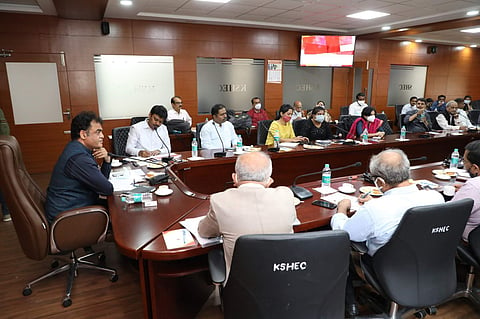

With Karnataka being the first state to implement National Education Policy, the Higher Education Council of Karnataka has said that the model curriculum based on NEP will be out in the first week of September and it will be implemented across all the universities for undergraduate students in the first week of October. Professor Pradeep P, Commissioner for Collegiate Education, Government of Karnataka, said that only 10 to 15 per cent of the curriculum either will be tweaked or changed. The rest will remain the same. Some subjects might not be altered at all, he added.
The new curriculum will have some digital elements as well, said Dr Pradeep. "We are starting from the bottom level of education to see the impact it will make on education as well as students and institutions. Once the model curriculum is to all the universities, they can implement the same. The textbook panel committees have already designed and approved the syllabus for various courses or degrees. We can say that the curriculum for every subject will be altered by 10 to 15 per cent," he said. "Physics will continue to have the same concepts and will not change. The same holds true for subjects like History, Geography, Political Science and among few others. The model curriculum is designed in such a way that each chapter has one video from the teacher who is a subject expert, a Powerpoint presentation and ten multiple-choice questions," he added.
Dr Pradeep also said that the students will be introduced to AI, Cyber Security and a lot of additional courses in addition to the existing ones. "These ten multiple-choice questions are based on what the students learn in that particular class or even a chapter. So far, we have given more importance to the summative assessment. But after the implementation of NEP, there will be more formative assessment which will happen almost on all the days once a chapter is completed. Then there is conceptual assessment and continuous comprehensive evaluation. Besides the basic concepts in the model curriculum, there will be courses that can be used to enhance the skills and abilities of students. It will include Artificial Intelligence, Cyber Security, Financial Literacy and so on. Similarly, this October, engineering students will get to learn ethics, human and constitutional values, health and wellness courses and many other subjects (that are not part of their curriculum now)," he added.
The schools in Karnataka are already following the three language policy which is in line with the NEP's push towards multilingualism. But Kannada is a compulsory subject for first-year UG students in the state. When asked about the foreign nationals coming to India for higher studies and if Kannada is mandatory for them, he said, "Students coming from other countries will be taught functional Kannada which already exists in the VTU system for engineering students. Others will learn the language and its literature in depth."
Dr Pradeep said that the state will implement the Multiple Entry-Exit Scheme proposed by the NEP 2020. Currently, the model curriculum will be implemented only for first-year undergraduate students. Dr CN Ashwathnarayan, Minister for Higher Education, said, "Preparations and drafts related to postgraduate courses as well as Angandwadoi, Primary and Secondary Schools are being done. We will also make changes as per the feedback from students and various stakeholders after this implementation."
